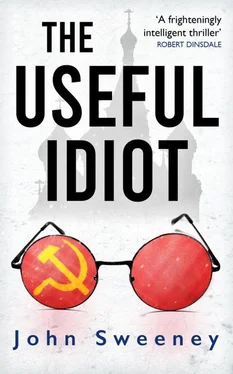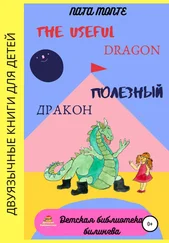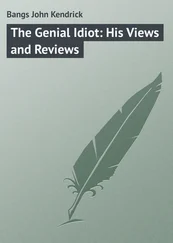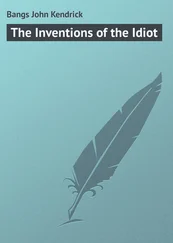John Sweeney - The Useful Idiot
Здесь есть возможность читать онлайн «John Sweeney - The Useful Idiot» весь текст электронной книги совершенно бесплатно (целиком полную версию без сокращений). В некоторых случаях можно слушать аудио, скачать через торрент в формате fb2 и присутствует краткое содержание. Город: London, Год выпуска: 2020, Издательство: Silvertail Books, Жанр: Исторический детектив, Триллер, на английском языке. Описание произведения, (предисловие) а так же отзывы посетителей доступны на портале библиотеки ЛибКат.
- Название:The Useful Idiot
- Автор:
- Издательство:Silvertail Books
- Жанр:
- Год:2020
- Город:London
- ISBN:нет данных
- Рейтинг книги:4 / 5. Голосов: 1
-
Избранное:Добавить в избранное
- Отзывы:
-
Ваша оценка:
- 80
- 1
- 2
- 3
- 4
- 5
The Useful Idiot: краткое содержание, описание и аннотация
Предлагаем к чтению аннотацию, описание, краткое содержание или предисловие (зависит от того, что написал сам автор книги «The Useful Idiot»). Если вы не нашли необходимую информацию о книге — напишите в комментариях, мы постараемся отыскать её.
* * *
The Useful Idiot — читать онлайн бесплатно полную книгу (весь текст) целиком
Ниже представлен текст книги, разбитый по страницам. Система сохранения места последней прочитанной страницы, позволяет с удобством читать онлайн бесплатно книгу «The Useful Idiot», без необходимости каждый раз заново искать на чём Вы остановились. Поставьте закладку, и сможете в любой момент перейти на страницу, на которой закончили чтение.
Интервал:
Закладка:
“Did he tell them?”
“No.”
He kissed her and said nothing. A few moments ago, she’d said that between lovers there should be no secrets. What had happened between Attercliffe and him at Kurskaya station, that would be an exception.
She ran her fingers through his hair, stroking his face. “There was something else, too. They wanted to know if he had heard about a document, some kind of protocol agreement between the German army and the Soviet side.”
“Who was running the interrogation?”
“Lyushkov. He is the most brutal one they’ve got. Yagoda knows Lyushkov got rid of Zakovsky to advance his own career but they don’t care. In their eyes, he’s the best.”
In the distance, a great thump sounded from an iron foundry. They held each other more tightly and, whispering even more quietly than before, they planned their exit. No bags, no preparation. Reporters often made the run to Helsinki from Moscow, to freshen up, to buy things you just couldn’t get in Moscow: film, typewriter ribbons, fine wine. The magic paper from Yagoda might just do the trick. They would tell no-one and go north, to Finland. They would do so that very night.
“What happens if we…”
Jones’ words faded away.
“…get caught?” asked Evgenia. “Then we’re dead. We’re dead anyway.”
The hardest thing was behaving normally. They could take nothing out of the ordinary with them: just the clothes they stood up in, all his money, his passport, her ID card, her magic letter. Being normal also meant that they had to go to the Hall of Columns for Professor Aubyn’s press conference on the findings of his research into Soviet society, and what that meant for the United States’ policy of non-recognition of the Soviet government. On the way, they passed seventeen bodies in the snow. Before, when the famine had been raging just in the countryside, it had been easier to ignore. But now, in February 1933, it was claiming so many lives in the centre of Moscow that it was a fact of life, like the omnipresence of Stalin, like the fear scribbled so brutally in people’s faces, like the endless cold.
All the boys were there: Duranty, with an Uzbek woman translator who looked a third of his age, Lyons, Fischer, the rest of the gang. Behind them sat some several hundred loyal workers from some Stalinist factory who had been corralled along to make up the numbers. Lyushkov prowled a side aisle, a smile on his lips, a revolver on his hip. Other uniformed guards strutted here and there. The plainclothes Cheka men were scattered on the benches, their look of self-confident boredom giving them away. Borodin’s film crew was present for the great moment but there was, of course, no Max.
Jones and Evgenia were the last to enter. The two of them sat together at the far left of the second row from the front. Duranty, sitting at the far right, leaned forward and winked at both of them conspiratorially, as if they had been late for church – which, in a way, they had.
“I hate being the subject of gossip,” said Jones.
“Get used to it,” Evgenia whispered in his ear, “it will be far worse in Paris.”
“No, Macynlleth.” She squeezed his hand.
Dr Limner appeared first, followed onto the stage by Aubyn. This time there was no translator. Everything would go much more smoothly, more quickly if the workers did not understand a word.
In the side aisle, Lyushkov made a “get up” gesture with both hands and the workers stood up, en masse. The foreign reporters knew submission wasn’t the proper form, but this was Stalin’s Russia. They stood up too.
Aubyn cast his hands out, Christ-like, to still the sea of humanity. Down they all sat. His face lit up, ecstatic that so many had come to listen to his thoughts.
“Erm…”
What followed was a long list of wrong numbers, fake statistics fashioned by people in thrall to the Cheka, un-facts presented as power wanted them, not as they were. The biggest lie of all, as usual, was the “astonishing progress” made by the Soviet Union in the production of food. So much wheat, so much barley, so much meat of all kinds. If that were for a moment true, thought Jones, then why weren’t the seventeen corpses they had seen that morning aware of it?
Eventually, Aubyn’s drone came to a conclusion: “And so I hereby state that the considered view of the Aubyn Commission is to recommend that… erm… the United States should mark the very real progress made by the Soviet Union and note the fundamentally peaceful nature of Soviet ambition and so extend diplomatic recognition to the… erm… Soviet…erm…”
In the side aisle, Lyushkov rammed his great pink hams together and the workers rose up, cheering and applauding. The film crew captured the applause, the workers in a frenzy, their worship of the professor and their rapture at his words never to be doubted. In the end, it was Aubyn who stopped the demonstration and then asked for questions.
The reporters knew the nature of the farce they were taking part in. A month ago, Jones might have uttered a faltering half-challenge, suggesting – but not articulating clearly – the essential absurdity of Aubyn citing food statistics created by a police state while the corpses of the famine victim stacked up in the snow outside, horribly easy for all to see. But now he had a chance of a life and a future with Evgenia, and he dare not risk it. The others, too, had their reasons to acquiesce.
“No questions at all?” Aubyn’s voice was high-pitched, querulous.
Duranty raised a languid hand. The film crew scuttled towards him, the sound recordist using his long boom to capture the reporter’s question.
“Professor, thank you very much for a most stimulating talk. Some newspapers in the West have been airing stories that the Soviet Union, far from being the bread basket of Europe, is actually suffering a famine. Would you like to comment?”
“This story… erm… concocted by propagandists sympathetic to Herr Hitler… erm… is a monstrous lie. There is no famine here. On the contrary, there is so much food being produced that the Soviet Union is exporting more grain than ever before.”
Once again, Lyushkov made the “stand up” gesture with his hands and, once again, the workers expressed joy unbound and rapture unconfined.
Jones’ hand went up. “Professor, thank you very much for your most interesting talk. Having finished the work of your commission, what are your plans now?”
“Erm… I find the Soviet Union a most stimulating place… I plan to go on a cultural tour of the country before making my way back, slowly, reluctantly, to Washington DC.”
The meeting was called to a close and the reporters drifted out into the fresh air. Outside, the sky was overcast, the cold less biting than before.
Duranty came up to Jones and Evgenia, his eyes lively, his voice warm. “Your question was a bit dull, old cock. But talk of famine is a monstrous lie, eh? Is the Western Mail going to report that? The New York Times most certainly will. Best angle of the day, no?”
“Yes, best angle of the day.”
“Is anyone going to organise a send-off for old Max?”
The question cut both Jones and Evgenia to the quick. Their faces, pink with the cold, turned to grey.
“Not a funeral, I guess,” said Duranty, “not the way he died. But something to mark his passing, surely?”
Jones recovered first. “Not sure that would be appropriate, Duranty. Officially, Max died of suicide.”
“You don’t believe that suicide nonsense, do you?” asked Duranty, all of the warmth gone from his eyes.
“No,” said Jones, “I don’t. And you? The other day it seemed you did.”
“I never believe a word anyone says here on principle.”
Читать дальшеИнтервал:
Закладка:
Похожие книги на «The Useful Idiot»
Представляем Вашему вниманию похожие книги на «The Useful Idiot» списком для выбора. Мы отобрали схожую по названию и смыслу литературу в надежде предоставить читателям больше вариантов отыскать новые, интересные, ещё непрочитанные произведения.
Обсуждение, отзывы о книге «The Useful Idiot» и просто собственные мнения читателей. Оставьте ваши комментарии, напишите, что Вы думаете о произведении, его смысле или главных героях. Укажите что конкретно понравилось, а что нет, и почему Вы так считаете.












